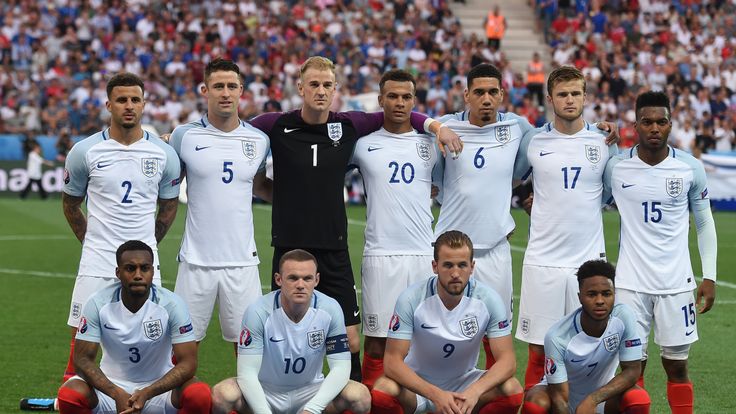
Tuesday 28 June 2016 10:26, UK
England crashed out of Euro 2016 with an embarrassing 2-1 defeat to Iceland in the last 16.
Wayne Rooney's fourth-minute penalty gave Roy Hodgson's side an early lead at the Allianz Riviera, but Iceland hit back through Ragnar Sigurdsson and Kolbein Sigthorsson and England were unable to find a way back.
Hodgson announced his resignation in the post-match press conference, leaving England facing an early return home after one of the biggest shocks in European Championship history. Here, we look at what went wrong for the Three Lions in France...
It was difficult to identify an obvious playing style or game plan throughout England's Euro 2016 campaign. Hodgson never appeared to know his best side, and his improvised approach was typified by the bizarre decision to put Harry Kane on corners in their Group B opener against Russia, only to take him off them in their later games.
Wayne Rooney earned plaudits for some of his performances in France, but his move into a deep-lying midfield role was another peculiarity. Hodgson had never previously used the 30-year-old there, and England's new-look midfield struggled to gel given their lack of playing time together.
England lacked cohesion and structure all over the pitch. A dearth of creativity was obvious in the games against Wales, Slovakia and Iceland, and it left Hodgson relying on individuals to produce moments of magic. Daniel Sturridge came up with one such moment against Wales, but there was no repeat in the last 16.
England travelled to Euro 2016 with a formidable strike-force that accounted for 70 Premier League goals last season, but they only managed three in four games between them in France. Only Germany averaged more than England's 20.5 shots per game, but dismal finishing became a theme of their tournament.
Their profligacy was a constant source of frustration, and despite attempting 56 more shots than their opponents at Euro 2016 (82 to 26), England scored as many goals as they conceded. Their struggles reflected badly on Hodgson, who gave his strikers a public dressing-down when they only scored nine goals from 47 attempts in an open training session.
England's defence was identified as a weakness before the tournament and so it proved. Hodgson's men were undone by a routine aerial ball for Russia's last-minute equaliser in their Group B opener in Marseille, and Iceland's equaliser arrived in similar circumstances as they failed to defend Aron Gunnarsson's long throw.
England's defenders also struggled with the physicality of Reading striker Hal Robson-Kanu against Wales, and they were carved open far too easily for Iceland's winning goal in Nice. Hodgson's full-backs got forward well throughout the tournament, but at the other end there was a glaring lack of stability across the back four.
Joe Hart endured a wretched tournament in goal. The Manchester City goalkeeper was only guaranteed his starting berth at Euro 2016 after an injury ruled Stoke's Jack Butland out of the tournament in England's pre-tournament victory over Germany, and his shaky domestic form continued in France.
Hart conceded four goals from just five shots on target, and two high-profile errors highlighted his vulnerability. The first came when he was beaten by Gareth Bale's speculative free kick from 35 yards in Lens, and the second arrived when he allowed Sigthorsson's low shot to creep agonisingly over the line against Iceland.
Harry Kane rejected suggestions that he was suffering from burnout in the build-up to the Iceland game, but his dismal performance in Nice provided further evidence to the contrary. The Premier League top scorer toiled as England chased the game in the second half, and his struggles are hardly surprising given the sheer number of games he has played this season.
Kane has not had a summer off since 2014, and the Iceland game was his 64th appearance of the season. The long campaign also appeared to have caught up with his Tottenham team-mate Dele Alli. The 20-year-old was outstanding for Spurs in 2015/16, but he was unable to replicate his domestic form on the international stage.